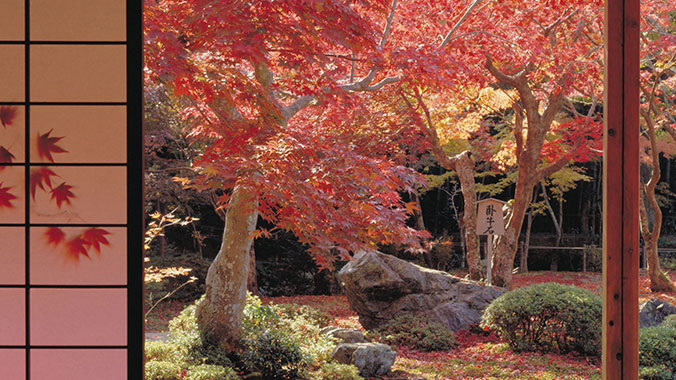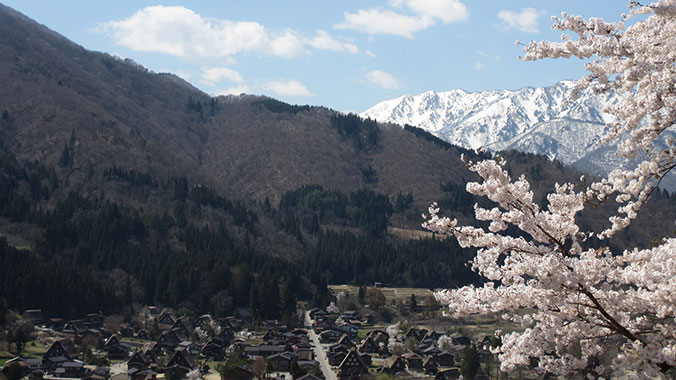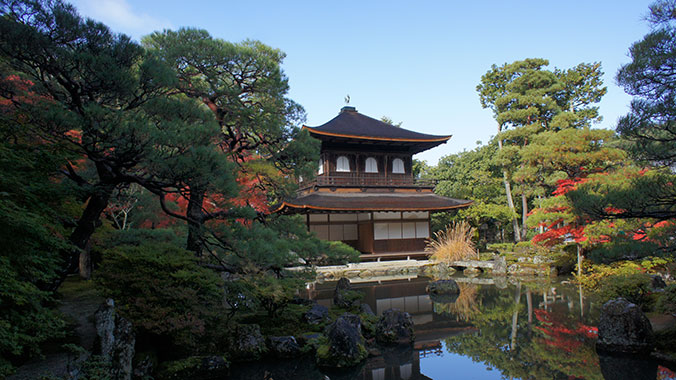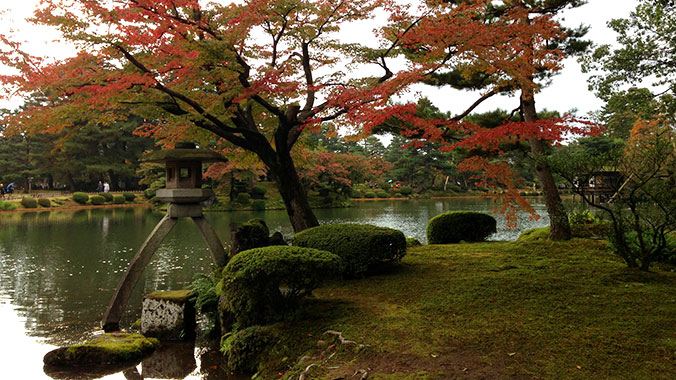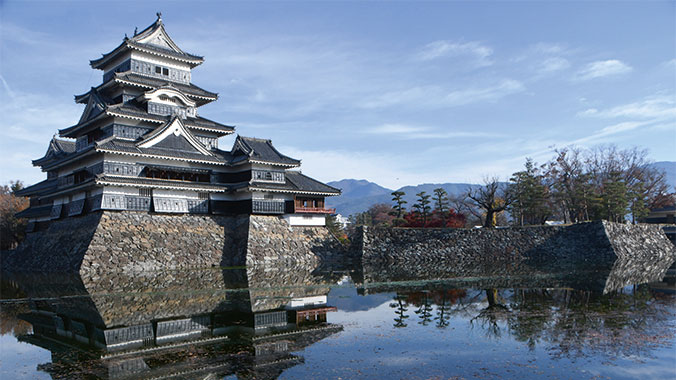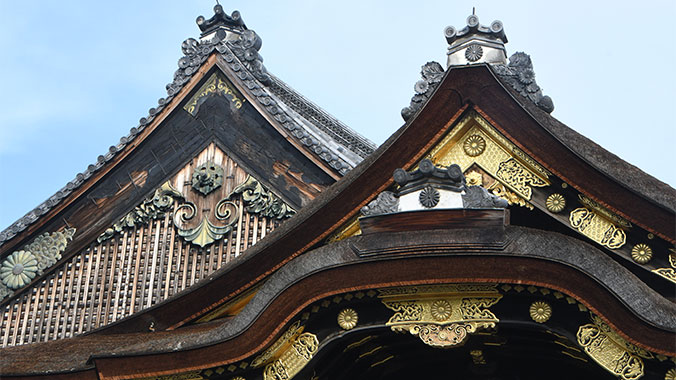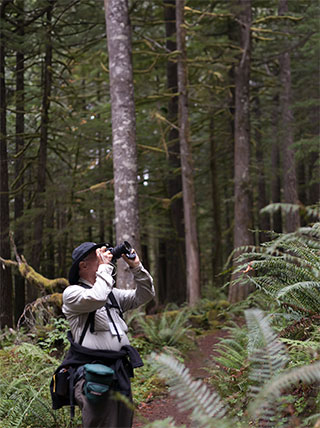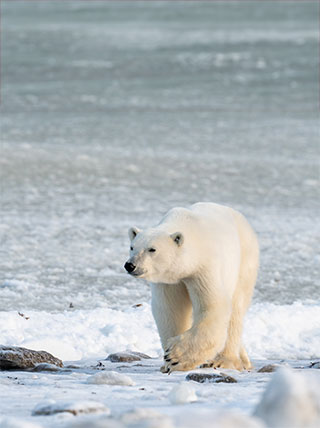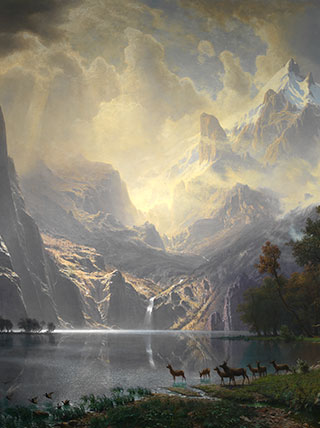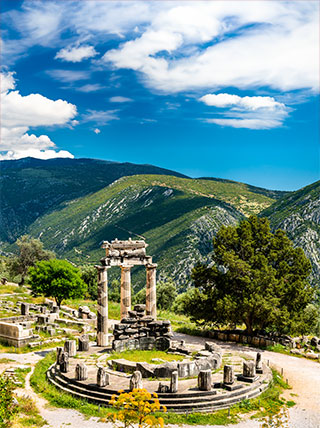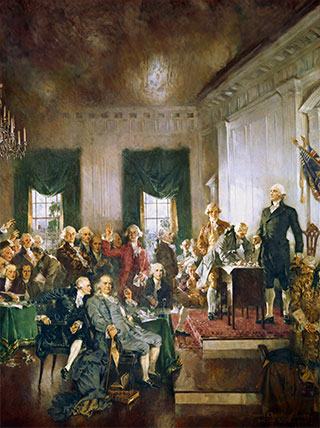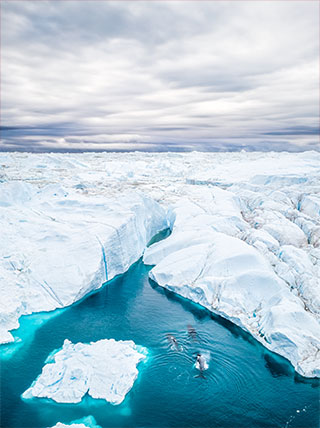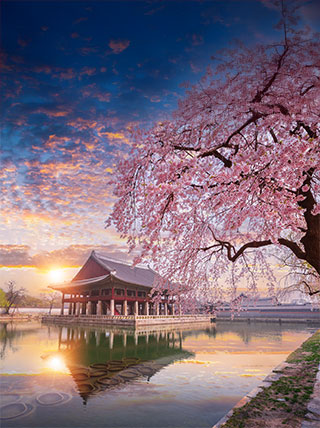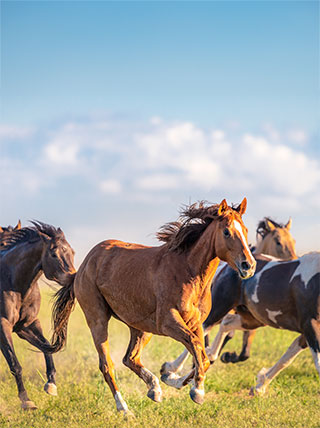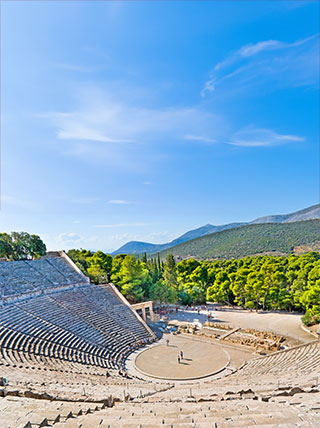Japan
The Cultural Highlights of Japan
Program No. 19725RJ
Take the adventure of a lifetime as you dive deep into the ancient culture of Japan, discovering iconic monuments, ancient traditions and world-renowned cuisine.
Enroll with Confidence
We want your Road Scholar learning adventure to be something to look forward to—not worry about. Learn more
Protecting the Environment
We offset a portion of the emissions created by your travel. Learn more
Prefer to enroll or inquire by phone?
800-454-5768
Select your type of room
Price will update based on selection
Prices displayed below are based on per person,doubleoccupancy.
Activity Level:
Keep the Pace (8)
DATES
& starting prices
PRICES
Apr 7 - Apr 22, 2025
Starting at
8,699May 5 - May 20, 2025
Starting at
8,699Sep 22 - Oct 7, 2025
Starting at
8,699Activity Level:
Keep the Pace (8)
DATES
& starting prices
PRICES
Mar 3 - Mar 18, 2025
Starting at
9,539Apr 7 - Apr 22, 2025
Starting at
9,539May 5 - May 20, 2025
Starting at
9,539May 19 - Jun 3, 2025
Starting at
9,539Sep 22 - Oct 7, 2025
Starting at
9,539Activity Level:
On Your Feet (3)
DATES
& starting prices
PRICES
Mar 24 - Apr 8, 2025
Starting at
8,999Activity Level:
On Your Feet (3)
DATES
& starting prices
PRICES
Mar 24 - Apr 8, 2025
Starting at
10,159Not seeing the date you're looking for?
To be notified if dates of this program become available, click the button below.
This date is available to book as a private experience for your group!
16 days
15 nights
35 meals
14B 11L 10D
1
In Transit to Program
In Flight
6
The Nakasendo Way, Narai Post-town
Matsumoto
9
The Samurai & Their Domains
Kanazawa
16
Program Concludes
In Flight
At a Glance
Gain unique insight into the fascinating culture of Japan on this journey that explores the country’s national identity from samurai traditions to ultramodern cities. Experience energetic Tokyo, iconic Kyoto, the soaring Japanese Alps and more. Appreciate Japan’s engaging, friendly people and savor its cuisine, a delight for the eyes and the stomach.
Activity Level
Varies by date
Participants must handle their own luggage at all times. Walking and standing for up to three miles, four hours per day. Some longer walks are optional.

Small Group
Love to learn and explore in a small-group setting? These adventures offer small, personal experiences with groups of 13 to 24 participants.
Best of all, you’ll…
- Explore Tokyo’s remaining links to historic Edo, the seat of power of the Tokugawa Shogunate.
- Learn about traditional Japanese arts including the intricacies of the tea ceremony, which you learn with a tea master in Kyoto.
- Experience the delights of Japan’s culinary traditions from the freshest sushi obtainable through temple vegetarian cuisine to popular izakaya restaurants.
Featured Expert
All trip experts

Kazui Yabe
Native-born Japanese Kazui Yabe graduated from Meiji University in Tokyo, then spent four months at Southern Illinois University in Illinois to hone her English skills before returning to Japan. Kazui is passionate about the distinctly Japanese theater of kabuki, known for the stylization of its drama and the elaborate makeup worn by its performers. She is friend with many of the actors and provides an insider’s look at life behind the scenes.
Please note: This expert may not be available for every date of this program.

Kazui Yabe
View biography
Native-born Japanese Kazui Yabe graduated from Meiji University in Tokyo, then spent four months at Southern Illinois University in Illinois to hone her English skills before returning to Japan. Kazui is passionate about the distinctly Japanese theater of kabuki, known for the stylization of its drama and the elaborate makeup worn by its performers. She is friend with many of the actors and provides an insider’s look at life behind the scenes.

Kathleen Aoki
View biography
Kathleen Aoki majored in Latin American Studies, but an opportunity to teach English in Japan led her to discover her second home — Nagasaki. A twenty-five career at a major Japanese electronics manufacturer in Tokyo followed, where Kathleen learned the business culture of corporate Japan. During this time she married, raised a family and did her stint of PTA duty. With her kids almost grown, Kathleen decided to begin a career as an instructor making the most of her interest in travel and knowledge of Japan.

Michael Drzmisek Sozui
View biography
Michael was born in Switzerland and first came in contact with Japanese culture came through the martial arts Aikido and Iaido. He originally started to study Japanese calligraphy and later chanoyu to complement martial arts studies but became increasingly interested in tea over the years. After more than twenty years of experience, Michael sees chanoyu as a way of communication between people and ideas. The focus of his tea studies is not only to be a tea master, but to become a true tea person.

Junko Kawamura
View biography
Junko Kawamura is the director of the Association for Spreading Noh Gaku and a professor at the Ikenobo Bunka University. Junko moved to Kyoto on her marriage to the late Nobushige Kawamura; the lead actor of the Kanze school of Noh drama. She has been involved with the management of the Kawamura Noh Theatre and of the Ladies’ Association for the Appreciation of Noh. As a passionate denizen of Kyoto, Junko has taken an important role in promoting traditional culture in the city.

Jamie Dwyer
View biography
Jamie graduated from Macalester College in 2002 with a BA in Asian studies. The following year, he returned to work in west Japan to teach English and international relations. After four years working in Hyogo and Okayama Prefectures, he joined the Peace Boat as volunteer staff, teaching English and leading groups in the ports of call. He then received a master's degree in agriculture from the Tokyo University of Agriculture and Technology in 2012. Jamie and his wife live in the Kyoto countryside.

Timon Screech
View biography
Timon Screech was professor of the history of art at the School of Oriental and African Studies (SOAS), University of London from 1991 to 2021, when he left the UK in protest over Brexit. He is now a professor at the International Research Center for Japanese Studies (Nichibunken) in Kyoto. Screech is a specialist in the art and culture of early modern Japan.

Reina Yamada
View biography
Reina Yamada was born and raised in Yokohama, but spent her teenage years in Dubai and her early adult years in the UK. She graduated from Loughborough University with a sports management degree, and has largely worked in sports development and event management. Reina moved back to Japan in 2019 to work for the Organizing Committee of the Tokyo 2020 Olympic and Paralympic Games. She is passionate about traveling, and enjoying and appreciating the cultures and traditions of countries around the world.

Yoko Ozawa
View biography
Yoko Ozawa was born and raised in a suburb of Tokyo. She first traveled overseas as a university student staying in San Francisco. After a career at a securities company, Yoko decided to become a Japanese language teacher. She worked in Australia for two years, and upon returning to Japan, she took up studies at Yokohama National University and graduated with an M.A. in language education. Yoko and her family have lived overseas, for four years in the UK and another four in the U.S.A.
Suggested Reading List
(28 books)
Visit the Road Scholar Bookshop
You can find many of the books we recommend at the Road Scholar store on bookshop.org, a website that supports local bookstores.
The Cultural Highlights of Japan
Program Number: 19725
Kaempfer's Japan: Tokugawa Culture Observed
A good account of what it was like to travel in the Tokugawa period.
Japan Adventure Map
Printed on waterproof and tear-resistant paper, this double-sided map shows all the islands of Japan at a scale of 1:1,300,000.
The Samurai
This historical novel by one of Japan's best-known modern writers is set in the world of the 17th-century Samurai. A Roman Catholic, Endo explored Christianity and morals in his many novels and stories.
A Traveller's History of Japan
A lively and concise narrative history of Japan and its transformation from Shinto, Shogun and Samurai traditions to 20th-century powerhouse.
In Praise of Shadows
This extended essay by the great Japanese novelist, first published in 1933, offers tremendous insight into traditional Japanese art, architecture and design.
Culture Smart! Japan
A concise, no-nonsense guide to local customs, etiquette and culture, this is a helpful travel tool for visitors to Japan.
The Dog Shogun
Arguably one of the most notorious figures in Japanese history, Tsunayoshi (1646 to 1709) was viewed as a tyrant with eccentric policies, including the Laws of Compassion, which made maltreatment of dogs an illegal offense, punishable by death. Bodart-Bailey delves deep into the shogun’s life, offering an engaging and brilliantly researched biography of the fifth Tokygawa shogun.
The Book of Tea
A graceful, witty meditation on Japanese aesthetics and culture as reflected through the tea ceremony. A celebrity and cultural ambassador, Okakura was a curator at Boston's Museum of Fine Arts.
Super Sushi Ramen Express
Using keen insight and sarcastic wit, Booth describes the cuisine and culture of Japan as he recaps the nearly three months-long foodie road trip he and his family took through the island nation. A fun journey, sure to both entertain and inform.
The Little Book of Japan
Veteran Japanophiles Vilhar and Anderson produced this illuminating collection of 44 essays on Japanese life and culture, which, even in the 21st century remains elusive and poorly understood.
The Old Capital
Kawabata captures perfectly the tension between tradition and new ways in postwar Japan in this lyrical novel set in Kyoto.
Memoirs of a Geisha, A Novel
The runaway best-selling novel about a geisha in the celebrated Gion district of Kyoto. A major feat of literary impersonation, the novel is rich in period detail and ceremony.
The Art of Setting Stones & Other Writings from the Japanese Garden
In these lyrical essays, Kyoto resident and landscape architect Marc Peter Keane uses eight Japanese gardens as bases for essays on nature, religion and aesthetics. His rich, meditative excursions find beauty in garden composition - every element gaining importance and interconnectedness.
Thousand Cranes
This novella by the great Kawabata may be Japan's best-known literary work, a story of love, grief and redemption. Kawabata's prose is as economical as the tea ceremony itself and very beautiful.
Japan's Cuisines
This illustrated overview charts the transformation of Japanese cuisine over the ages, revealing the influences of private and public institutions, exploring the rise of tea and showing how lunch became a gourmet meal.
Where the Dead Pause, and the Japanese Say Goodbye
When her American father passes away, Mockett seeks consolation in her mother’s home country of Japan. She visits a radiation zone, a Buddhist school, temples and festivals in an effort to understand the Japanese way of grieving, to bury her dead and find healing.
Lonely Planet Japanese Phrasebook
A handy palm-sized guide to pronunciation, basic grammar and essential vocabulary for the traveler.
The Book of Tokyo: A City in Short Fiction
This anthology of contemporary Japanese short stories was edited with the traveler in mind. The ten pieces of literature, mystery, science fiction and horror form an imaginary tour of the city of Tokyo.
Walking the Kiso Road: A Modern-Day Exploration of Old Japan
William Scott Wilson travels along the ancient Kiso Road, historically used by samurai and warlords and relatively unchanged today. As he makes his way, Wilson engagingly ruminates on Japanese history, culture and folklore.
Kyoto, A Cultural History
A rich portrait and guide to the gardens, monasteries, art, history and culture of Kyoto, once Japan's capital, founded 1,200-years ago.
Seeing Kyoto
In this oversized visual celebration of Kyoto and neighboring Nara, long-time resident Carpenter presents the cobblestone streets, temples, gardens, history and traditions of the ancient capital.
The Inland Sea
Richie's masterpiece, more than a travel account, is a beautiful reflection on all things Japanese by one of its most acute observers.
Learning to Bow, Inside the Heart of Japan
As surprising, helpful and informative as it is funny, this is an insightful account of travels and teaching in Japan. Feiler presents anecdotes on the rituals, personality traits and cultural peccadilloes of the Japanese.
A Year in Japan
Williamson records her extended stay in Kyoto, its architecture, gardens, culture and traditions in 350 watercolor illustrations.
Hiroshima
This classic book, first published in 1946, has been hailed as the greatest piece of journalism in the 20th century. Pulitzer Prize-winning writer Hersey puts a human face on the Hiroshima tragedy through interviews with survivors.
Tokyo, A Biography
In his 500-year history of Tokyo, Mansfield presents the Japanese capital as an "indestructible organism" that has survived bombs, earthquakes and radiation and continues to thrive. An easy introduction to a fascinating city.
Eyewitness Guide Japan
Dazzling illustrations, architectural cutaways and color photographs, along with useful local maps, give this guide to Japan's many attractions a distinct edge.
Bending Adversity, Japan and the Art of Survival
Financial Times Asia editor Pilling captures the dynamism and diversity of Japan after the 2011 tsunami. He interviews, among many, novelist Haruki Murakami, former prime minister Junichiro Koizumi, industrialists, bankers, activists and artists, teenagers and octogenarians.
Program
At a Glance
Duration
16 days
Program Begins
Tokyo
Program Concludes
Kyoto
Group Type
Small Group
Meals
35
| 14B |
11L |
10D |
Activity Level
Gain unique insight into the fascinating culture of Japan on this journey that explores the country’s national identity from samurai traditions to ultramodern cities. Experience energetic Tokyo, iconic Kyoto, the soaring Japanese Alps and more. Appreciate Japan’s engaging, friendly people and savor its cuisine, a delight for the eyes and the stomach.)
Best of all, you'll...
- Explore Tokyo’s remaining links to historic Edo, the seat of power of the Tokugawa Shogunate.
- Learn about traditional Japanese arts including the intricacies of the tea ceremony, which you learn with a tea master in Kyoto.
- Experience the delights of Japan’s culinary traditions from the freshest sushi obtainable through temple vegetarian cuisine to popular izakaya restaurants.
Featured Expert

Kazui Yabe
Native-born Japanese Kazui Yabe graduated from Meiji University in Tokyo, then spent four months at Southern Illinois University in Illinois to hone her English skills before returning to Japan. Kazui is passionate about the distinctly Japanese theater of kabuki, known for the stylization of its drama and the elaborate makeup worn by its performers. She is friend with many of the actors and provides an insider’s look at life behind the scenes.
Please Note:
This expert may not be available for every date of the program

Kathleen Aoki
Kathleen Aoki majored in Latin American Studies, but an opportunity to teach English in Japan led her to discover her second home — Nagasaki. A twenty-five career at a major Japanese electronics manufacturer in Tokyo followed, where Kathleen learned the business culture of corporate Japan. During this time she married, raised a family and did her stint of PTA duty. With her kids almost grown, Kathleen decided to begin a career as an instructor making the most of her interest in travel and knowledge of Japan.

Jamie Dwyer
Jamie graduated from Macalester College in 2002 with a BA in Asian studies. The following year, he returned to work in west Japan to teach English and international relations. After four years working in Hyogo and Okayama Prefectures, he joined the Peace Boat as volunteer staff, teaching English and leading groups in the ports of call. He then received a master's degree in agriculture from the Tokyo University of Agriculture and Technology in 2012. Jamie and his wife live in the Kyoto countryside.

Timon Screech
Timon Screech was professor of the history of art at the School of Oriental and African Studies (SOAS), University of London from 1991 to 2021, when he left the UK in protest over Brexit. He is now a professor at the International Research Center for Japanese Studies (Nichibunken) in Kyoto. Screech is a specialist in the art and culture of early modern Japan.

Reina Yamada
Reina Yamada was born and raised in Yokohama, but spent her teenage years in Dubai and her early adult years in the UK. She graduated from Loughborough University with a sports management degree, and has largely worked in sports development and event management. Reina moved back to Japan in 2019 to work for the Organizing Committee of the Tokyo 2020 Olympic and Paralympic Games. She is passionate about traveling, and enjoying and appreciating the cultures and traditions of countries around the world.

Yoko Ozawa
Yoko Ozawa was born and raised in a suburb of Tokyo. She first traveled overseas as a university student staying in San Francisco. After a career at a securities company, Yoko decided to become a Japanese language teacher. She worked in Australia for two years, and upon returning to Japan, she took up studies at Yokohama National University and graduated with an M.A. in language education. Yoko and her family have lived overseas, for four years in the UK and another four in the U.S.A.
Activity Level
Keep the Pace
Varies by date
Small Group
(13 to 24)
Love to learn and explore in a small-group setting? These adventures offer small, personal experiences with groups of 13 to 24 participants.
Suggested Reading List
View Full List
(28 Books)
You can also find many of the books we recommend at the Road Scholar store on bookshop.org, a website that supports local bookstores.
HAVE QUESTIONS?
Prefer to enroll or inquire by phone?
We can help. Give us a call, and we can answer all of your questions!
Call
800-454-5768
While we make every effort to ensure the accuracy of our published materials, programs are typically advertised more than a year prior to their start date. As a result, some program activities, schedules, accommodations, personnel, and other logistics occasionally change due to local conditions or circumstances. Should a major change occur, we will make every effort to alert you. For less significant changes, we will update you during orientation. Thank you for your understanding.
Duration
16 days
15 nights
What's Included
35 meals | 14B | 11L | 10D |
6 expert-led lectures
21 expert-led field trips
6 hands-on experiences
An experienced Group Leader
14 nights of accommodations
Taxes and customary gratuity
Road Scholar Assurance Plan
Day
1
In Transit to Program
Location:
In Flight
Day
2
Arrival Tokyo, Welcome Dinner
Location:
Tokyo
Meals:
D
Stay:
Art Hotel Nippori Lungwood
Activity Note
Hotel check-in available from 3:00 p.m., meet group in hotel lobby at 6:45 p.m., for 7:00 dinner and start of program.
Afternoon:
After some time to relax and get settled, we’ll meet in the hotel lobby and walk to a nearby restaurant where we will go over program logistics and have dinner.
Dinner:
At a restaurant near the hotel, we’ll enjoy a family-style meal together for our Orientation Dinner, with one Welcome Drink (beer, wine, coffee, tea) and water included; other beverages available for purchase.
Evening:
The Group Leader will greet everyone and lead introductions. We will briefly go over safety guidelines, emergency procedures, and answer questions. This program will be accompanied by both a Group Leader, who will primarily handle logistics, and mulitple Study Leaders who will lead most lectures and field trips, unless otherwise specified. Meals will include water and tea; other beverages will be available for purchase, unless specified otherwise. Periods in the daily schedule designated as “Free time” and “At leisure” offer opportunities to do what you like and make your experience even more meaningful and memorable according to your personal preferences. Please refer to the attachments at the end of this document for suggestions. The Group Leader will also be happy to offer suggestions. Program activities, schedules, personnel, and indicated distances or times may change due to local circumstances/conditions. In the event of changes, we will alert you as quickly as possible. Thank you for your understanding. We’ll then return to the hotel. Continue getting to know your fellow Road Scholars, settle in, and get a good night’s rest for the day ahead.
Day
3
History Overview, Tokyo Highlights, National Museum
Location:
Tokyo
Meals:
B,L,D
Stay:
Art Hotel Nippori Lungwood
Activity Note
Walking approx. 2 miles throughout the day; mostly flat, pavement, some steps, elevators and escalators may not always be available. Driving approx. 10 miles total throughout the day, with stops; about 2 hours.
Breakfast:
At the hotel, we’ll enjoy a tasty breakfast buffet with juice, coffee, tea, water.
Morning:
After the program Orientation, which will review the up-to-date program schedule, discuss roles and responsibilities, and logistics, we begin our exploration of Japan with a lecture on not only Tokyo’s, but also an overview of Japan’s history by our Study Leader that will set the stage for our exploration of Japanese culture. Boarding our motor coach, we go for an exploration of Tokyo, including the Imperial Palace, site of the Shogun’s castle, with your Study Leader. Our route will take us by other areas of historical import and give us a feel for the scale of the metropolis.
Lunch:
At a local restaurant, we’ll have plated meals with tea, water; other beverages available for purchase.
Afternoon:
After lunch we transfer to the Tokyo National Museum. The oldest and largest in Japan, the museum houses over 110,000 objects including 600 Important Cultural Properties. The museum is located on the edge of Ueno Park, a very pleasant park to stroll through.
Dinner:
At a local restaurant, we’ll have a family-style meal with tea, water; other beverages available for purchase.
Evening:
At leisure.
Day
4
Cultural Entertainment in Japan, Free Time
Location:
Tokyo
Meals:
B,L
Stay:
Art Hotel Nippori Lungwood
Activity Note
Walking approximately two miles; more depending on personal preference in the afternoon; gentle pace. Some stairs, elevators and escalators may not always be available.
Breakfast:
Hotel buffet.
Morning:
During a morning lecture given by an expert in Kabuki, we’ll learn about this classical Japanese dance-drama that has been performed in Japan since 1603. Afterwards, a visit to the Kabuki-za theater's kabuki museum for an examination of the art form's inner workings.
Lunch:
A light lunch at a restaurant in Kabuki-za; tea and water included; other beverages available for purchase.
Afternoon:
Free time to explore the area independently beginning in the mid-afternoon. Please refer to the list of Free Time Opportunities in the attachments. The Group Leader will be happy to offer other suggestions as well.
Dinner:
This meal has been excluded from the program cost and is on your own to enjoy what you like. Please refer to the list of suggested restaurants in the attachments as well as in the handouts provided by the Group Leader.
Evening:
At leisure. Be sure to prepare for check-out and transfer in the morning.
Day
5
Japanese Feudal Castle Towns, Matsumoto, Miso Manufacturer
Location:
Matsumoto
Meals:
B,L,D
Stay:
Matsumoto Hotel Kagetsu
Activity Note
Driving approx. 145 miles; about 3.5 hours to Matsumoto. Walking approximately 1.5 miles. Shoes will need to be removed to enter some of the attractions today.
Breakfast:
Hotel buffet.
Morning:
After checking out of the hotel, we’ll leave Tokyo and travel into the heart of central Japan to Matsumoto, a pleasant regional city surrounded by the Japanese Alps. As we travel, we’ll learn about the establishment of the Tokugawa Shogunate through a lecture delivered by our Study Leader. Upon arrival in Matsumoto, we’ll go straight to a traditional miso manufacturer’s facility to learn and see how this essential Japanese foodstuff is made.
Lunch:
At the miso manufacturer’s establishment, we’ll enjoy a delicious plated lunch featuring their product with tea, water; other beverages available for purchase.
Afternoon:
A visit to Matsumoto's modern art museum which features a permanent exhibition of one of Matsumoto's most prominent figures, Yayoi Kusama. Carrying on, we’ll then check into the hotel.
Dinner:
At the hotel, we’ll have plated meals with tea, water; other beverages available for purchase.
Evening:
At leisure.
Day
6
The Nakasendo Way, Narai Post-town
Location:
Matsumoto
Meals:
B,L
Stay:
Matsumoto Hotel Kagetsu
Activity Note
Transferring approx. 30 miles one way; about 2 hours total. Walking about 2 miles in Narai; approx. 1.5 hours; flat terrain around Narai. Shoes will need to be removed to enter some of the attractions today.
Breakfast:
At the hotel, we’ll enjoy a Western plated breakfast with juice, coffee, tea, water.
Morning:
Boarding our coach, we set out to Narai, one of the best-preserved post towns of the old Nakasendo Highway. Lying at the foot of the difficult Torii Pass (4200 feet), Narai prospered from the travelers who would rest there in order to prepare for the difficult journey ahead. While here, we will view the distinctive wooden houses with their overhanging roofs and the many well-preserved features of an old post town.
Lunch:
At a local restaurant, we’ll have plated meals with tea, water; other beverages available for purchase.
Afternoon:
After lunch, we head back to Matsumoto to visit the Japan Ukiyo-E Museum. Based on the private collection (more than 100,000 pieces) of the Sakai family dating back 300 years, the museum features a rotating display of about 100~150 images focusing on a seasonal theme, and rotating every two months or three months. A lovely way to enjoy this historic art form and end our day before returning to the hotel.
Dinner:
On your own to sample the local fare. Please refer to the list of suggested restaurants in the attachments as well as in the handouts provided by the Group Leader.
Evening:
At leisure. Be sure to prepare for check-out and transfer in the morning.
Day
7
Japan Central Alps, Takayama Festival Floats
Location:
Takayama
Meals:
B,L,D
Stay:
Hotel and Spa Gift TAKAYAMA
Activity Note
Walking about 1 mile in and around Matsumoto Castle; some very steep flights of steps and polished wooden floors; Driving approx. 50 miles; about 2.5 hours to Takayama. Walking of about 2.5 miles total throughout the day. Shoes will need to be removed to enter some of the attractions today as well as upon arrival at the hotel.
Breakfast:
Hotel plated meal.
Morning:
After checking out of the hotel and again boarding our coach, we go on a visit to the city's castle. The keep of Matsumoto Castle, an impressive and imposing structure, is an original which dates back to the late 16th century and is one of only five in Japan to be designated a National Treasure. While here, we’ll be given insights into the establishment and the importance of castle towns under the Tokugawa Shogunate. We’ll also delve into the facts with our Study Leader and compare them to common myths surrounding samurai. We’ll then leave Matsumoto and drive through the spectacular scenery of Japan’s Central Alps on our way to Takayama, also known as ‘Little Kyoto’ by the locals. Upon arrival, we’ll explore this compact, delightful town on foot with our Study Leader.
Lunch:
At a local restaurant, we’ll have tasty plated meals with tea, water; other beverages available for purchase.
Afternoon:
Our arrival in Takayama will take us to the Festival Floats Exhibition hall, where 11 of the floats for this famous festival are kept and displayed on rotation, four at a time. These floats date back to the 17th century, and their detailed wood carvings and metal work reflects the districts of Takayama that they represent. We’ll then check into the hotel with some time to freshen up and relax before dinner.
Dinner:
At the hotel, we’ll enjoy a traditional plated Japanese-style dinner. Tea and water included; other beverages available for purchase.
Evening:
At leisure. Be sure to prepare for check-out and transfer in the morning.
Day
8
Regional Architecture, Jinya, Kanazawa Geisha Quarters
Location:
Kanazawa
Meals:
B,L,D
Stay:
Kanazawa New Grand Hotel
Activity Note
Driving approx. 75 miles; about 2 hours. Walking approx. 2 miles throughout the day, half in the morning in Takayama and half in Kanazawa in the afternoon; mostly flat terrain on pavement.
Breakfast:
At the hotel, we’ll enjoy a delicious buffet featuring Western and Japanese dishes, plus coffee, tea, water.
Morning:
Largely isolated by the surrounding mountains, Takayama fiercely protected its independence under pressure from the Shogunate, which eventually had to resort to direct rule. Through a visit to the historic Jinya, the Shogunate’s local headquarters, we’ll gain insight into Takayama's proud history and daily life in the provinces. As we continue, we’ll take in the picturesque Sanmachi district of town where the streets are lined with many beautifully preserved traditional shops, inns, restaurants, cafés, private homes and museums. Along the way, we’ll see the sake breweries where this very palatable drink is made and perhaps sample a glass or two. Our Study Leader will show us around and answer any questions.
Lunch:
Plated meal at a local restaurant.
Afternoon:
Then we will board our motorcoach for transfer to Kanazawa. Spared from large scale bombing during the Pacific War, Kanazawa retains much of its distinct charm. Upon arrival we explore one of the former Geisha quarters before transferring to our hotel.
Dinner:
At the hotel, we’ll have delicious plated meals featuring Kaga cuisine, well-known throughout Japan. Tea and water included; other beverages available for purchase.
Evening:
At leisure.
Day
9
The Samurai & Their Domains
Location:
Kanazawa
Meals:
B
Stay:
Kanazawa New Grand Hotel
Activity Note
Walking approx. 2 miles during group activities throughout the morning; mostly flat with some slopes and steps; more depending on personal preference.
Breakfast:
At the hotel we’ll enjoy a breakfast buffet with juice, coffee, tea, water.
Morning:
In the Edo Period, Kanazawa flourished economically and culturally under the powerful Kaga Clan. With the exception of the Shogun’s family, the Kaga Clan was the wealthiest family with a worth of more than one million koku - one koku (about six US bushels) was defined as enough rice to feed one person for a year. The city’s glorious past is still palpable in its samurai quarters, former pleasure quarters and temples. The Kenrokuen Gardens and the imposing, recreated castle buildings, which we will walk through led by our Study Leader, attest to the power of the Clan’s wealth and evoke their grand lifestyle.
Lunch:
On your own to enjoy local regional fare.
Afternoon:
Free time. Take this opportunity for personal independent exploration to see and do what interests you most. Please refer to the list of Free Time Opportunities in the attachments. The Group Leader will be happy to offer other suggestions as well. You may wish to check out the Samurai Quarter or, for a change of pace, the 21st Century Museum of Contemporary Art is an acclaimed, ultra-modern structure that is as much of an attraction as the art housed inside.
Dinner:
On your own to explore the local fare. Please refer to the list of suggested restaurants in the attachments as well as in the handouts provided by the Group Leader.
Evening:
At leisure. Be sure to prepare for check-out and transfer in the morning.
Day
10
The Japan Sea, and the "Mackerel Highway"
Location:
Obama
Meals:
B,D
Stay:
Hotel Urban Port
Activity Note
Walking approx. 1.5 miles in Kanazawa throughout the morning; mostly flat with some steps. Driving approx. 110 miles; about 2 hours to Obama. Shoes will need to be removed to enter some of the attractions today.
Breakfast:
Hotel buffet.
Morning:
After checking out of the hotel, we’ll take a stroll through a nearby samurai quarter and visit a samurai residence built in 1583 that has recently been awarded two Michelin stars. After returning to the hotel to board our motorcoach, we’ll then set out on our driving transfer along the coast to the seaside town of Obama.
Lunch:
On your own, choose from various options at a Service Area on route to Obama.
Afternoon:
We arrive in Obama, famed for its seafood, and is the start of the "Mackerel Highway" - transporting heshiko, vinegar, and other foodstuffs to the Imperial Court in feudal times. Stopping at the Wakasa Chopstick Museum, we will learn about the history of Wakasa Lacquerware, and Wakasa Lacquerware chopsticks – 80% of the lacquer chopsticks in Japan are produced in this area. We will also have our first hands-on experience while in Obama here, trying our hand at polishing our own lacquer chopsticks. Later, we check into our accommodations and have some time to relax and enjoy the hot spring baths.
Dinner:
At the inn, we’ll experience Japanese hospitality at its best with a Kaiseki multi-course plated meal, with tea, water; other beverages available for purchase.
Evening:
At leisure.
Day
11
Seaside towns, food culture museum, scenic vistas
Location:
Obama
Meals:
B,L,D
Stay:
Hotel Urban Port
Activity Note
Walking approx.. 2 miles throughout the day, generally flat ground, but some inclines and hills. Transfers via private coach.
Breakfast:
At the inn we’ll have a traditional plated Japanese breakfast with juice, coffee, tea, water.
Morning:
Setting out from our hotel, we first visit the oldest temple in the Wakasa area, Myoraku-ji, a national important cultural property, well known for its statue of the Goddess of Mercy, Kannon. From there, we head to the Wakasa Obama Food Culture Museum, an interesting combination of the area’s culinary history, cooking studio, crafts activity area, and hot springs. We enjoy a hands-on experience making Japanese paper postcards.
Lunch:
A buffet style lunch, focusing on locally produced ingredients, in a restaurant with expansive views of the area.
Afternoon:
Following our repast, our journey takes us to the charming seaside town of Tagarasu, where we visit a former local elementary school, now used to make heshiko, mackerel fermented in brine and rice bran during the spring, to be eaten in the fall, where we will see how this traditional food is made. We wind up the day with a visit to the Rainbow Line Mountain Peak Park, with stunning views of the Mikata Five Lakes and the surrounding countryside.
Dinner:
At the inn, we enjoy a plated meal, with tea, water; other beverages available for purchase.
Evening:
At the inn, the remainder of the evening at leisure. Be sure to prepare for check-out and transfer in the morning.
Day
12
Small-Scale Agriculture & Rural Ecology in Japan
Location:
Kyoto
Meals:
B,L,D
Stay:
Daiwa Roynet Hotel Kyoto Shijo-Karasuma
Activity Note
Driving approx. 70 miles; about 1.5 hours to Miyama and 1.5 hours to Kyoto. Walking approx. 2 miles throughout the day; gentle pace with short bus transfers between sites. Extended periods of standing in the afternoon. Shoes will need to be removed to enter some of the attractions today.
Breakfast:
At the inn we’ll have a traditional plated Japanese breakfast with juice, coffee, tea, water.
Morning:
Once checked out of the hotel, we’ll drive to Miyama where we will focus on sustainable architecture and rural living. We will also try our hand at thatching: putting on thatch bundles, tying some knots and shaving it down to the right angle to give a taste of the skills required for this ancient art.
Lunch:
Tasty bento box lunch at a nearby local restaurant.
Afternoon:
Our day continues with a visit to the Kayabuki no Sato thatched village. When we get there, we’ll go on a stroll around the houses led by our Study Leader before visiting the indigo gallery.
Dinner:
After arriving into Kyoto, at a local restaurant we will enjoy nice dinner with tea, water; other beverages available for purchase.
Evening:
At leisure.
Day
13
Ashikaga Yoshimasa & Japanese Arts
Location:
Kyoto
Meals:
B,L
Stay:
Daiwa Roynet Hotel Kyoto Shijo-Karasuma
Activity Note
Walking approx. 3 miles throughout the day; gentle pace, some stairs, elevators and escalators may not always be available. Short transfers via coach.
Breakfast:
Hotel buffet.
Morning:
Setting out from the hotel, we’ll begin a comprehensive multi-stop field trip led by our expert Study Leader. First, we’ll arrive at Ginkaku-ji temple (Silver Pavilion), built by the 8th Ashikaga Shogun Yoshimasa. Like his grandfather, Yoshimitsu, Yoshimasa was a great patron of the arts but a poor governor of the nation. While Kyoto was engulfed in the internecine and destructive Onin Wars, the Higashiyama culture began and flourished at Ginkaku-ji. Based largely on the ideals and aesthetics of Zen Buddhism and the concept of wabi-sabi, which can be translated as beauty in simplicity, Higashiyama culture centered on the development of the Japanese tea ceremony, ikebana flower arranging, Noh drama, and sumi-e ink painting. Our next stop will be the Kyoto Museum of Crafts and Design and begin with an introduction to the city’s splendid artisan crafts before walking to nearby Heian Jingu, a vast Shinto shrine complex that was modeled on an ancient imperial palace.
Lunch:
Local restaurant plated meal.
Afternoon:
Then we’ll travel to explore the world-famous geisha quarter of Gion. The area emerged in order to accommodate the needs the many travelers and pilgrims coming to visit nearby Yasaka Shrine.
Dinner:
This meal has been excluded from the program cost and is on your own to enjoy what you like. Please refer to the list of suggested restaurants in the attachments as well as in the handouts provided by the Group Leader.
Evening:
At leisure.
Day
14
The Mystery of Noh Theater, Free Time
Location:
Kyoto
Meals:
B,L,D
Stay:
Daiwa Roynet Hotel Kyoto Shijo-Karasuma
Activity Note
Short transfer via taxis to lecture. Walking approx. 1/2 mile during group activity; mostly flat terrain. More dependent on personal preference.
Breakfast:
Hotel buffet.
Morning:
Setting out via taxi and on foot, we’ll transfer to a lecture hall to learn about the traditions and symbolism of Noh theatre through a lecture and demonstration.
Lunch:
Plated meal at a nearby restaurant.
Afternoon:
Free time. Take this opportunity for personal independent exploration to see and do what interests you most. Please refer to the list of Free Time Opportunities in the attachments. The Group Leader will be happy to offer other suggestions as well.
Dinner:
Local restaurant plated meal.
Evening:
At leisure.
Day
15
Tea Ceremony, Daitoku-ji, Nijo Castle, Farewell Dinner
Location:
Kyoto
Meals:
B,L,D
Stay:
Daiwa Roynet Hotel Kyoto Shijo-Karasuma
Activity Note
Short transfers via coach. Walking approx. 2 miles throughout the day; extended periods of standing in the afternoon. Siting on either tatami mats or small chairs on the floor during tea ceremony. Space is limited at the tea room, and that large groups will be split into two, reversing the daily itinerary. Sitting on the floor at lunch. Shoes will need to be removed to enter some of the attractions today.
Breakfast:
Hotel buffet.
Morning:
We’ll start out by exploring the massive 56-acre Daitoku-ji temple complex associated with Sen no Rikyu, the ultimate master of the tea ceremony. While here, we’ll explore the meaning of Zen Buddhist rock gardens and the origins of some notable Japanese architectural features. Rounding off the main theme today, we’ll then experience a tea ceremony in the informative and enthralling company of a tea master. We’ll delve into the ceremony, a delightful and deeply meaningful practice far from the rigid image it often has, and also make tea for each other.
Lunch:
At a Shojin Ryori, a temple vegetarian restaurant located by the 56-acre Daitoku-ji temple complex, we’ll enjoy a tasty plated meal with tea, water; other beverages available for purchase.
Afternoon:
To round off the main theme of today, we’ll go on an expert-led field trip to Nijo-jo Castle, the only residence of the shogun still in existence, for a chance to learn about the daily life at the shogun's court.
Dinner:
At a restaurant near the hotel, we’ll celebrate our journey over a delicious plated farewell dinner. Tea, water included; other beverages available for purchase. Share some of your favorite experiences from the program with new Road Scholar friends.
Evening:
At leisure. Be sure to prepare for check-out and departures in the morning.
Day
16
Program Concludes
Location:
In Flight
Meals:
B
Activity Note
Hotel check-out by 11:00 a.m. See your program’s travel details regarding transfers.
Breakfast:
Hotel buffet. This concludes our program.
Morning:
If you are returning home, safe travels. If you are staying on independently, have a wonderful time. If you are transferring to another Road Scholar program, detailed instructions are included in your Information Packet for that program. We hope you enjoy Road Scholar learning adventures and look forward to having you on rewarding programs in the future. Please join our Facebook page and share photos of your program. Visit us at www.facebook.com/rsadventures. Best wishes for all your journeys!
Please select a day to update the map
Map details are not available for this location.
MEALS
35 Meals
14 Breakfasts
11 Lunches
10 Dinners
LODGING
Lodgings may differ by date. Select a date to see the lodgings specific to that date.
Showing Lodging For:
- Nov 10, 2025 - Nov 25, 2025
- Mar 03, 2025 - Mar 18, 2025 (Tokyo to Kyoto)
- Mar 10, 2025 - Mar 25, 2025 (Tokyo to Kyoto)
- Mar 24, 2025 - Apr 08, 2025 (Tokyo to Kyoto)
- Apr 07, 2025 - Apr 22, 2025 (Tokyo to Kyoto)
- May 05, 2025 - May 20, 2025 (Tokyo to Kyoto)
- May 19, 2025 - Jun 03, 2025 (Tokyo to Kyoto)
- Sep 22, 2025 - Oct 07, 2025 (Tokyo to Kyoto)
- Oct 06, 2025 - Oct 21, 2025 (Tokyo to Kyoto)
- Oct 27, 2025 - Nov 11, 2025 (Tokyo to Kyoto)
- Nov 10, 2025 - Nov 25, 2025 (Tokyo to Kyoto)
- Nov 24, 2025 - Dec 09, 2025 (Tokyo to Kyoto)
Participant Reviews
Based on 21 Reviews
Sort By:
If you’re interested in Japanese culture this is a great introduction.
— Review left October 19, 2024
Thanks to everyone. This was a wonderful experience and I truly enjoy meeting you all and making new friends. Merci beaucoup. Katrin
— Review left October 12, 2024
Cultural Highlights of Japan is a rich program full of wonderful experiences. Do take advantage of the “optional” Kabuki experience as a way to experience ancient theatre. The Noh (plays that predate Shakespeare) presentation is wonderful. This trip not only includes Tokyo and Kyoto, but also several days in the mountains (remember the Olympics in 1998 in Nagano) and the Mackerel Highway starting in Obama on the Sea of Japan. The only problem with the food is that it is so delicious we tended to overeat. I have taken many Road Scholar trips, and this was one of my favorites.
— Review left May 25, 2024
Cultural Highlights of Japan was most interesting, very enjoyable and absolutely educational! Loved every minute of this adventure, from the food, to the people, to the various cities and sights! A most delightful and memorable experience!
— Review left May 23, 2024
This trip met all my expectations for an informative, adventurous, and fun guided trip.
— Review left May 3, 2024
The trip was magical! We gained tremendous insight into Japanese history and culture, all while experiencing its incredible natural beauty, especially at cherry blossom time. It was perfection!
— Review left April 22, 2024
This trip, The Cultural Highlights of Japan, was excellent in every way. It was a fascinating introduction to a very different culture, an amazing blend of the modern and the ancient. Our guides were first rate and made sure that everything went smoothly. We learned so much about Japan, and saw so many things that we would have missed had we tried to arrange a tour on our own.
— Review left April 5, 2024
This program provides a great overview on the history and culture of Japan!
— Review left March 25, 2024
This delightful program exceeded my expectations and was so enjoyable. The group leaders were awesome, and the group of Road Scholars cohesive and fun. Thank you Road Scholar!
— Review left October 25, 2023
The smaller groups definitely contributes to the success of the trip (less participants = less problems.
Regardless of the emphasis to meet activity level, many participants struggle to keep up or to adjust due to old age and physical limitations. That's the reality. I came prepared with an optional activity on my own in case the program has to make adjustments due to participants limitations.
— Review left October 22, 2023
1. I was disappointed in the local sightseeing trip of Tokyo as the bus could only skirt around the outside of the city parameter. Also mention but we did not visit the East Garden.
We did visit the museum but there was so much more to see and do in Tokyo.
I would have missed a lot of the highlights of Tokyo if I did not arrive 3 days earlier.
2. The Inn at Obama was a 11 story hotel and we did not get to experience a tatami room as they did not reserve these rooms for us. This was very big disappointment as this was one of the highlight and experiences that I was looking forward to.
3. We also did not get to experiment making sushi for lunch.
We did however got to experience making paper and thatching a roof that was not on the original itinerary.
I know that itinerary is subject to change but they should let us know in advance so we can plan and be guided accordingly if these are the experience changes that we want as part of our trip itinerary.
Our local Japanese guide (Kaho??), she was wonderful and was very helpful! She gets a gold star!!!
Hotel were comfortable and food was good.
— Review left July 12, 2023
The Cultural Highlights of Japan tour is a perfect balance of talks, sight-seeing, hands-on activities, off-the-itinerary stops, and participants' camaraderie. The program offers so much and is logistically perfectly gauged, with stimulating activities and just the right amount of free time for individualized exploration. The food and accommodations were great, and the almost all double rooms were greatly appreciated by this single traveler. Finally, the staff was great: knowledgeable, warm, and responsive to our needs. Kudos to Road Scholar!
— Review left June 10, 2023
Excellent tour, per se, as intro to Japan. But, also, it's an edifying non-threatening "first venture" beyond Europe/Canada.
— Review left June 4, 2023
The program covered everything that I wanted to see. We were very lucky to have been there during the peak cherry blossom season.
— Review left April 6, 2023
Great program with wonderful hand on experiences. Easy walking, lots of photo opportunities and great Japanese food.
— Review left April 6, 2023
Overall it was a great trip and a good value considering all that was included. The group leaders were fantastic, and deserve a lot of credit for making the tour interesting and memorable. There was also a good amount of free time, allowing us to explore independently. Japan is a beautiful country and this experience has made me appreciate it even more.
— Review left April 4, 2023
Visting Japan has long been on my bucket list. The tour with Road Scholar provided many opportunities to learn about the country, the culture and the lovely people. The meals were outstanding, and we had sufficient free time to visit areas that each of us wanted to see.
— Review left December 21, 2022
This iss a well-conceived, well organized, and logical program that features excellent opportunities to understand Japanese culture. The staff are superb!
— Review left November 17, 2019
This was my third Road Scholar trip, and unlike the previous two, I was very disappointed in the educational content, more specifically, the instructor responsible for providing the on-location enrichment which is the hallmark of Road Scholar trips. We had an older woman who did not like to walk, who had no interest in gardens, who did not seem to know much about Buddhism or Shintoism, or if she did, wasn't interested in sharing her knowledge, and had nothing by the way of educational credentials which her position, as instructor, would have called for. I chose Road Scholar for this trip mainly because we would be accompanied by a full-time instructor, and now believe I would have been better served had a chosen an alternative travel company that makes more use of local experts in lieu of a full-time instructor. Most of what I learned about Japanese culture I got from my own pre-trip preparation and from the excellent tea master who we visited in Kyoto.
The trip logistics, hotels and meals were all fine (food better than I had expected) with the exception of the hotel we stayed in in Kanazawa which had serious HVAC issues (could not get room temp below 78 degrees) and a peculiar bathroom. Masaki was a delight as group leader, cheerful, helpful and very effective in handling transportation and dining arrangements. I thought that perhaps too much attention was given to arts & crafts, but I did take some time out in Kyoto to visit additional places not in the itinerary. I would recommend including Nara instead of the lecture on Noh theater (but since I skipped out on the Noh, I can't really make a fair comparison. I also thought the trip was not as active as I expected or wanted, and didn't really merit the activity rating it was given. Additionally, it would have been nice to include some use of the rail system, for which Japan is so famous. (On my own, I did use the subway system in Tokyo and Kyoto, and took the bullet train back to Narita airport)
— Review left June 11, 2019
The cultural highlights of Japan is an excellent tour and well organized by Walk Japan's instructors/guides. The program provided so much education about Japanese history, culture, art, clothing, and beautiful countryside. One of the best tours I've taken with Road Scholar (12 to date).
— Review left June 10, 2019
This was an excellent introduction to Japan. While we went to many touristy locations (museums, temples, shrines, gardens), we also had many "only in Japan" experiences such as visiting a miso factory, a sake brewery, a wasabi farm and an indigo museum. We also made tie dye scarves and molded candy/confections. The food was fabulous too - beyond our expectations!
— Review left April 26, 2019

